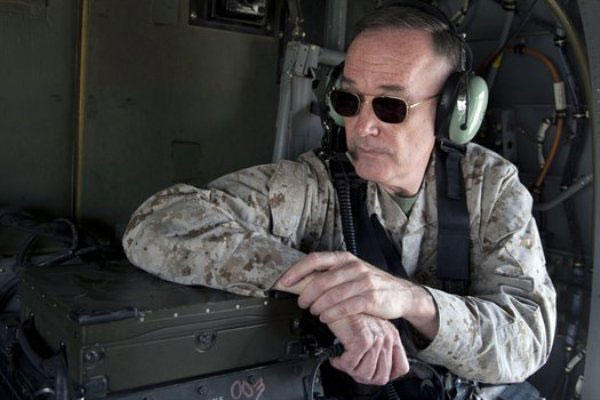The outgoing Marine commandant says he'll be handing Gen. Joseph Dunford a Marine Corps facing a budget crisis that could force more deployments with fewer troops.
The demand for Marines will only grow as conflicts emerge worldwide, Gen. James Amos said.
"I don't see the requirements going away," Amos said Tuesday. However, budget and personnel cuts could force Dunford to make the decision to bring Marines back into the fold, the outgoing Marine commandant said.
Amos, who is expected to retire in the fall after more than 40 years of service, spoke at a Brookings Institution forum Tuesday on the future of the Marine Corps in a military facing the long-term effects the Congressional sequester process on defense funding.
Dunford -- now commander of the International Security Assistance Force in Afghanistan -- has been nominated by President Obama to succeed Amos. Dunford is scheduled to face a confirmation hearing before the Senate Armed Services Committee on Thursday.
In his remarks and in response to questions at Brookings, Amos said that the sequester process "has a disproportionate effect on the Marine Corps because our budget is so small."
Amos said that his current budget is about $23.8 billion, down from $25.6 billion two years ago. The budget total leaves the Marine Corps with $2 billion for procurement, minus the costs of aviation which are shared with the Navy, Amos said.
"That's it -- $2 billion a year. That just gives you a sense of the magnitude of this thing," Amos said of sequester, even as the Corps looks to develop a new Amphibious Combat Vehicle and switch out its aging fleet of F/A-18 Hornets, AV-8B Harriers, and EA-6B Prowlers for the F-35 Joint Strike Fighter.
"I think we're going to be okay" for the next year following Congressional action that temporarily eased the impact of sequester, but Amos said he had little hope that sequester would be lifted for 2016 and beyond.
"I don't see Congress changing on sequester," Amos said. "I just don't see it happening."
About 190,000 active duty Marines make up the Corps' end strength -- down from 202,000 during the Iraq war, Amos said. The Marine Corps was going down to 182,000 and more likely 175,000 under sequester, Amos said.
The force of 175,000 will lead to less time at home after deployments, Amos said.
"You'll be gone for seven months, home eleven, and then gone again," he said.
Amos also said that in his remaining months he would not soften his positions against a 1.8 percent pay raise for the military and against easing standards for women seeking Marine infantry slots.
"We make it very hard. It's going to stay that way. I'm not going to lower standards. It's not going to happen on my watch," Amos said.
The outgoing commandant also said he backed a 1 percent raise versus a 1.8 percent pay increase.
"I think it's reasonable," Amos said.
Currently, 63 cents of every Marine dollar goes for compensation in pay, retirement benefits and health care, Amos said. If the trend continued, "you're going to have a Marine Corps that's an entitlement organization rather than a fighting organization," Amos said.
-- Richard Sisk can be reached at Richard.Sisk@monster.com.






























